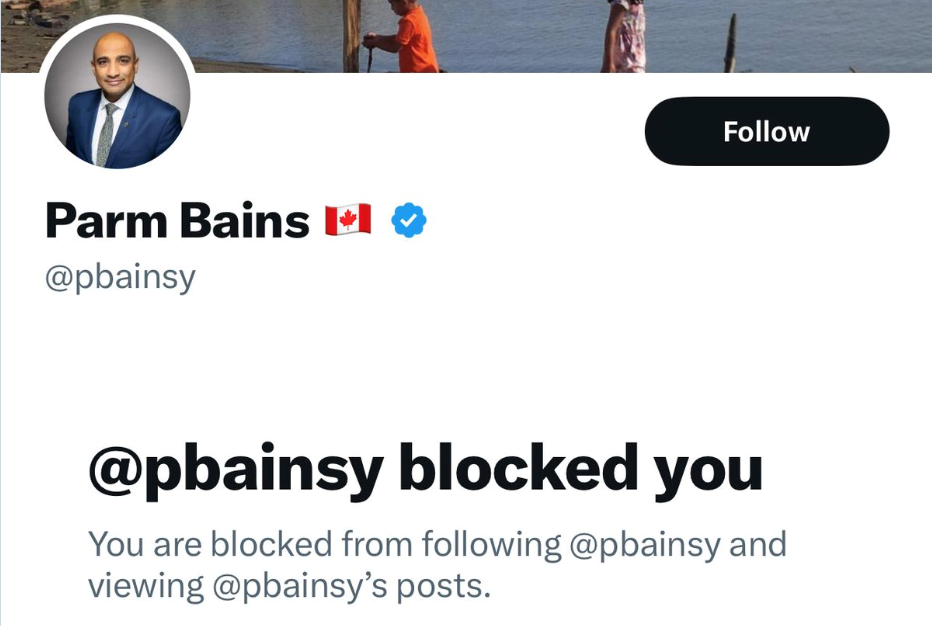B.C. journalist Bob Mackin says a Liberal member of Parliament is not upholding the standards of respect their party professes to have for media after blocking him on social media platform X.
“Unfortunately, when politicians say they support the media, I take it with a grain of salt,” said Mackin, who works independently for thebreaker.news and has previously freelanced for Business in Vancouver, a publication owned by Glacier Media.
This month, Mackin said Steveston-Richmond East MP Parm Bains blocked him on X, formerly known as Twitter.
Bains did not respond to Glacier Media by email and his office voicemail was full so a message could not be left by phone when no one answered during office hours over two days.
Mackin told Glacier Media he had been pursuing Bains to answer questions about circumstances surrounding his election in 2021; specifically, allegations from Bains’ chief rival and then incumbent Conservative MP Kenny Chiu of Chinese government-connected interference against Chiu.
Mackin noted a public inquiry into foreign interference in Canadian elections is expected to examine media reports the Chinese consulate favoured the Liberal Party of Canada in Steveston-Richmond East, among other ridings with a large Chinese diaspora.
Mackin said Bains “hasn’t responded to me at all when I’ve asked for his side of what happened” despite having been amenable to interviews immediately following his election.
Mackin argues he and all members of the public ought to be able to see an MP's social media accounts.
“I think it’s important for us to see what he does in the community,” said Mackin.
Politicians blocking journalists and members of the public on social media remains controversial.
Last September, a federal court judge ordered Minister of Environment and Climate Change Steven Guilbeault to unblock Rebel News founder Ezra Levant and pay him $20,000 in costs for having done so.
University of Ottawa law professor Michael Geist says Bains blocking a journalist does not meet the same threshold legally, as Guilbeault is a minister who speaks for government and Bains is only an MP.
“Though I think it’s a bad practice,” for any MP, said Geist by email.
“The principle is that everyone should have access to government information. Since cabinet ministers use their Twitter to speak on behalf of the government, everyone should have access and blocking users runs counter to that principle.
“On the other hand, ordinary MPs do not speak on behalf of the government so the same principle doesn’t apply. My own view is that public officials shouldn’t block (muting would be better), but from a legal perspective I think that courts would see a difference between a cabinet minister and an MP,” added Geist.
But Mackin asserts Bains plays a role in communicating for government.
“He isn’t just an idle passive backbencher. He is someone who is an important member of caucus,” asserted Mackin.
The journalist noted Bains is a member of the Standing Committee on Access to Information, Privacy and Ethics and the Standing Committee on Government Operations and Estimates.
Mackin said Bains, a communications instructor at Kwantlen Polytechnic University, is also lobbied and those lobbyists expect “him to bring their concerns into caucus.”
Bains’ X account was created in 2009 but also states he is “MP for Steveston Richmond East.” The MP appears to use the X account primarily to announce or highlight government initiatives.
South of the border, in the United States, courts have grappled with the same issue.
On March 15, the Supreme Court of the United States issued guidance to lower courts on this matter.
The court asserted blocking cannot be done when a message constitutes an action of the state.
“For social-media activity to constitute state action, an official must not only have state authority—he must also purport to use it.”
The decision left the lower courts to determine this matter, noting: “Many use social media for personal communication, official communication, or both—and the line between the two is often blurred.”
And, the decision stated, “an official who uses government staff to make a post will be hard pressed to deny that he was conducting government business.”




